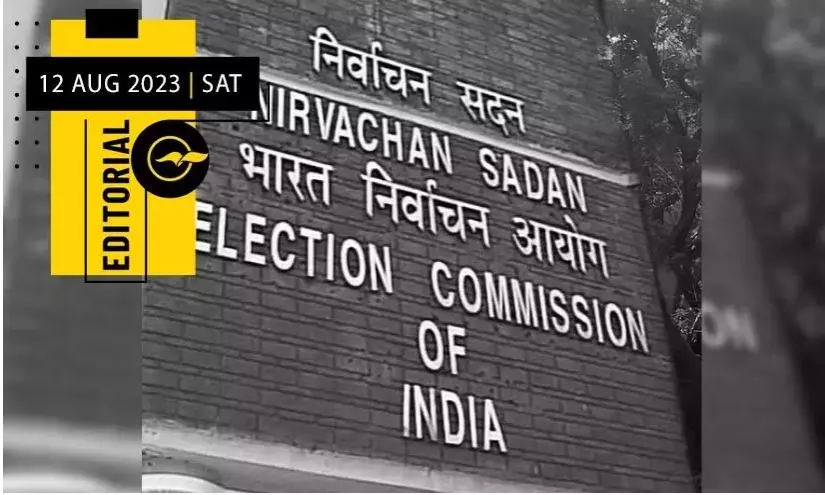
One more Bill to weaken democracy
text_fieldsThe Indian parliamentary democracy rests on two pivotal pillars: the organization of polls at fixed intervals and the oversight of these elections by impartial election commissions. While the democratic system isn't entirely immune to criticism, it's undeniable that the commission serves as an unparalleled model, organising the world's largest democratic exercise. However, the conversations and discussions surrounding the Election Commission have become less reassuring since the BJP's rise to central power. Doubts have been cast by recent government actions, hinting at a potential erosion of the commission's integrity through its continuous entanglement in controversies. In the past, the commission's complete autonomy from the executive branch guaranteed impartial interventions. These interventions effectively ensured diligent supervision of political parties, including the ruling party and the government itself, thereby winning the trust among citizens. Regrettably, this trust has waned in recent times. The introduction of the 'Chief Election Commissioner, Commissioners Election Bill, 2023' in the Rajya Sabha by Union Law Minister Arjun Ram Meghwal on Thursday is sure to exacerbate these concerns.
Currently, the electoral process in India is overseen by a three-member authority, comprising a Chief Election Commissioner and two commissioners. This system administers elections for both Houses of Parliament, State Legislatures, and Councils, as well as the President and Vice President. Historically, the Prime Minister has submitted members' names to the President for appointment. However, concerns over the independence and impartiality of this process led the Law Commission in 2015 to advocate a law aligning with Article 324 of the Constitution for appointment procedures. Legislative developments have emerged following a Supreme Court order in March 2023, prompted by petitions spanning 2015 to 2020. The Court mandated the creation of a temporary three-member committee tasked with recommending election commissioners to the President, bridging the gap until Parliament enacts a law. The existing process, controlled solely by the executive, was deemed inconsistent with democratic principles. This the committee mandated by the apex court included the Prime Minister, the Leader of the Opposition in the Lok Sabha, and the Chief Justice of the Supreme Court. If no recognized Leader of the Opposition exists, the position falls to the Leader of the largest party in the Opposition. This judicial intervention aims to uphold the dignity of democracy, promoting high standards of character and performance. Despite the Court's decision in March, no appointments have been made thus far due to the absence of commissioner vacancies. Now the government has presented a new law to Parliament, marking the next stage of this ongoing evolution.
The approach to appointment outlined in the Bill blatantly disregards the democratic principles underscored by the Supreme Court. The Commission has intentionally omitted the involvement of the Chief Justice of the Supreme Court in the appointment procedure. Instead, the appointment process will incorporate a cabinet member nominated by the Prime Minister. Notably, whereas commissioners' rank and remuneration had been equivalent to those of Supreme Court judges, the bill aligns them with that of the Cabinet Secretary. Despite the presence of the opposition leader on the committee, decision-making power predominantly rests with the government's representatives; the legislation does not specify whether the three-member committee's decisions will be based on a majority or unanimous agreement. In essence, the inclusion of the opposition leader is certain to be largely symbolic.
In a scenario where the Centre holds the authority for appointments, there exists a significant potential for commissioners be servile to their ‘masters’. The standards stipulated by the Bill for selecting commissioners, namely integrity, experience, and expertise in overseeing elections, can be subjected to different subjective interpretations. This framework may result in officials chosen by the ruling party's influential figures prioritizing their own interests. The deliberate exclusion of the Chief Justice from the arrangement and substitution of a minister under the Prime Minister appears to carry a certain malevolent intention within the current temporary system.
The commission in essence is armed with the ability to aid the ruling party in various procedures, including the compilation of timely data for voter list updates, the selection of election dates, the formulation and enforcement of a code of conduct, the arrangement of polling logistics, and the spacing out of polling days, particularly concerning matters within the Commission's jurisdiction. It begs justification for the government to inlcude the qualifications it deems necessary for a minister that a chief justice lacks within this framework. This bill, presented shortly after another bill that empowered the Union government to assume authority from the elected Delhi government, thus undermining the federal structure, adds further scepticism to the electoral process. It this is bound to go down in history as a testament to the government's record of anti-democratic steps





